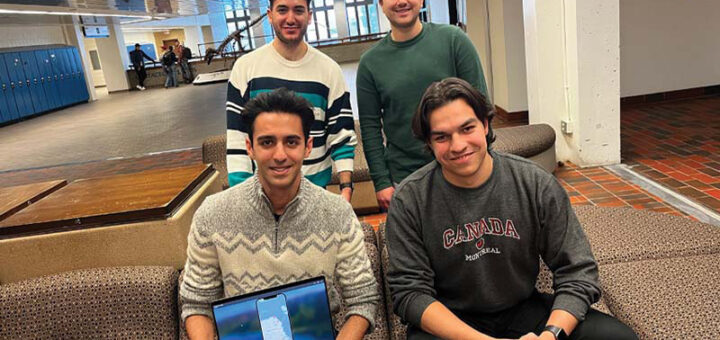App created by MRU students helps tackle food insecurity issues

Mikaela Delos Santos, News Editor
An assignment for a Computer Information Systems (BCIS) course has led four Mount Royal University (MRU) students to create an app that will help in tackling issues relating to food insecurity.
BCIS students Diego Anzola, Christian Shammas, Ramin Radmand and Brandon Bodemer have created WeGiveYouEat, an app where users are able to donate their unspoiled and untouched food locally.
Those who are hoping to pick up food are not required to create an account, although those who are donating will need to create one to be able to post and donate through the application. WeGiveYouEat will then connect the users to contact each other or provide directions via their Google or Apple maps.
The app is still currently in development. Due to the liabilities that come with donating food items, the group is looking into drafting a user agreement to help address legal issues. Food donors in Alberta are protected under the Charitable Donation of Food Act. Eventually, the group hopes to run the app as a non-profit business.
The group says that their motivation for this app was driven by learning that 9.52 per cent of MRU students struggle with food insecurity after a survey carried out by MRU faculty. Seventy-five per cent say that they are severely food insecure, which means that they are unable to purchase food, they sleep to avoid eating, or skip meals.
“We are also advocates for programs and policy changes around campus, such as the SAMRU food cabinets, that help to address the root causes of food insecurity, or working to reduce food waste on campus,” the four states.
The project has also prompted them to learn more about food safety and waste.
“Understanding the prevalence of food insecurity among our fellow students would likely also influence our views on food safety and food waste. We might become more conscious of the need to prioritize food safety in our own choices, and to be mindful of the impact that food waste can have on others.”
They also describe how their BCIS education provides a wide range of skills and tools that can be used to tackle social issues and make a positive impact. Some of these include creating apps and other tools that help with disaster response, relief and recovery and using data analysis and machine learning techniques to address social problems such as preventing disease outbreaks or detecting algorithm biases.
With all of these said, the four then individually talked about their plans after MRU.
“After graduating, my future career plans include furthering my experience in web development and UI/UX design,” says Bodemer. He is in his third year of the degree.
“[I] hope to start a full time position with ATB Financial working in Information Security. I would like to keep working on individual projects as well to further my knowledge in different areas,” Anzola shares. Anzola will be graduating this semester.
Radmand, who graduates in April, says that “[I] look forward to working in the software development industry with a focus on backend development, distributed systems and possibly embedded software down the line.”
“After MRU, my plans are to continue working on individual projects that I have started during my time at MRU (like our app) as well as continue gaining industry experience in the field of cyber security, ” says Shammas, who is also in his final year.


